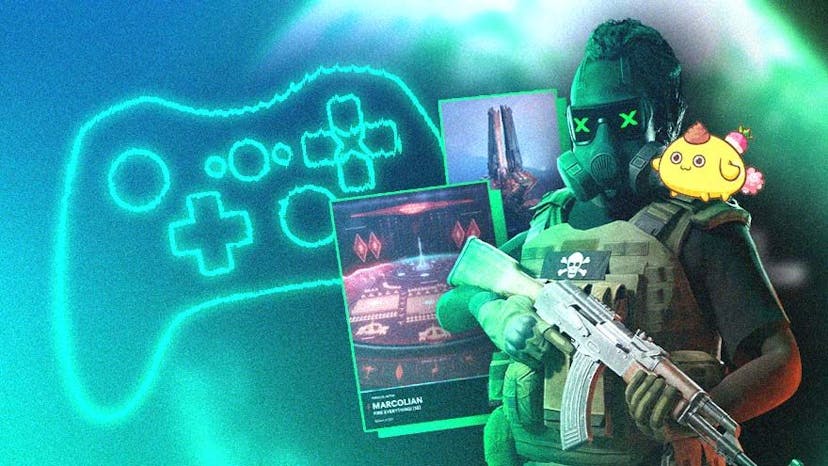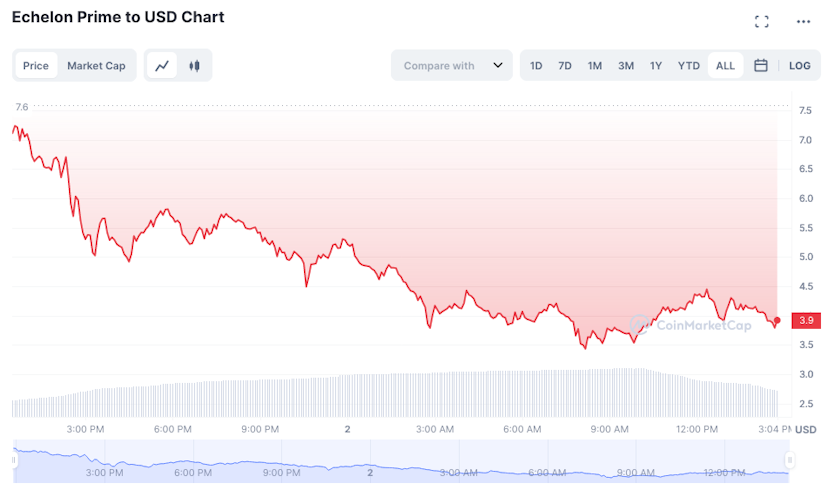GameFi Picks Up Steam As It Looks To Go Mainstream
PRIME, HyperPay and ‘Undead Blocks’ Debuted This Week
By: Aleksandar Gilbert • Loading...
NFTs & Web3
Despite falling steadily since its debut, PRIME, a token supporting crypto-based videogames including Parallel, a trading card game, has a market capitalization of just under $80M a day after its launch.
With a circulating supply of 20M tokens, PRIME is both a governance token for the organization that issues it, the Echelon Prime Foundation, as well as an in-game currency.
Parallel TCG, a virtual trading card game that will make first use of PRIME, will distribute PRIME to winners, who can then use the tokens to access collectibles and services created by the game’s parent company, Parallel Labs. The tokens can also be used for tournament entry and augmented reality experiences developed by Parallel Labs.
Interest in PRIME highlights investors’ optimism around GameFi, a crypto sub-market that marries videogames and finance and has seen steady development despite the fall from grace of one-time play-to-earn market leader Axie Infinity.
Just this week, a crypto videogame storefront, HyperPlay, went live via early access. And a former Goldman Sachs analyst released a zombie-themed videogame intended to address most crypto-based video games’ biggest weakness: they aren’t any fun.
Advocates of GameFi argue that crypto technology will revolutionize gaming.
Skin In The Game
Venture capital firm a16z, a major investor in crypto and in GameFi, believes crypto-based videogames will benefit players by blurring the line between leisure and work.
Traditionally, “the financial upside of successful games did not go to the gamer, despite the fact that you could spend hours of your life building up your in-game persona, acquiring assets, creating worlds,” partner Arianna Simpson wrote in a 2021 blog post announcing its investment in Play-to-Earn game Axie Infinity. “At the end of the day, you would have nothing to show for it other than the fact that you had a great time.”
But the technology has been controversial.
“What a cruel world we live in that people are compelled to commodify something so pure and essential to the human experience as play,” a video game developer told Vice last year.
Axie Infinity has been on the receiving end of bad press for its exploitative economy. While interest went through the roof during the bull market of 2021, it has cratered along with the broader crypto market, suggesting players were never really interested in the game itself.
Crypto developers are undeterred.
Last week, zkHoldem, an on-chain poker game powered by zero-knowledge technology, announced it would debut on Ethereum rollup Arbitrum.
Meanwhile, HyperPlay says its videogame store and store aggregator would challenge “de-platforming [and] extractive fees imposed by Web2 monopolies like Apple or Steam.”
The Apple Store infamously takes a 30% cut of in-app purchases, a tactic that has drawn scrutiny from antitrust regulators.
HyperPlay
HyperPlay says it will make its money by offering “convenience features” within the app, according to its co-founder, a former executive at leading crypto wallet MetaMask. For example, a crypto wallet overlay will allow players to transact without having to close the gaming window, the co-founder, who goes by JacobC.eth, told Decrypt.
The company will also vet games for malware before offering them through its platform.
“We’re not trying to make attestations that a game’s economy is a good sustainable economy,” JacobC.eth said. “That’s really for players to decide for themselves. But we’re very opinionated on stopping malware and stopping any kind of malicious bad actors.”
To date, Axie Infinity is the closest crypto-based game to reach anything approaching a mass audience, but it has been hobbled by a massive hack and the crypto bear market.
The problem, according to former Goldman Sachs analyst Grant Haseley, is that most of those games aren’t actually fun and feature inflationary in-game markets that dilute the value of assets players can accumulate.
Kill To Earn
His zombie-themed videogame “Undead Blocks,” billed as a mix of Mario Kart and Call of Duty, wants to change that. The game launched Tuesday on ImmutableX, another videogame-specific Ethereum rollup.
The launch briefly boosted ImmutableX’s token, IMX, which jumped almost 20% Tuesday.
As for PRIME, the token began trading just above $7 Wednesday. Following a pattern common among airdropped tokens, it fell to less than $4 a day later, according to data from CoinMarketCap.

PRIME Price
More than 60,000 wallets were eligible for PRIME based on their interaction with Parallel, a trading card game that will be the first to use the videogame-centric token.
But Parallel will be open to people both with and without crypto wallets. Making the game appealing to the latter is key to its success.
“For every one web3 gamer today, there are more than 10,000 traditional gamers that are accustomed to the current [free-to-play] model. Many of those players will not be initially willing to participate in web3 or even make a single purchase,” its website reads. “This essentially means that adoption of the game is paramount to the ecosystem’s success.”
Advertisement
Get the best of The Defiant directly in your inbox 💌
Know what matters in Web3 with The Defiant Daily newsletter, every weekday
90k+ investors informed every day. Unsubscribe anytime.